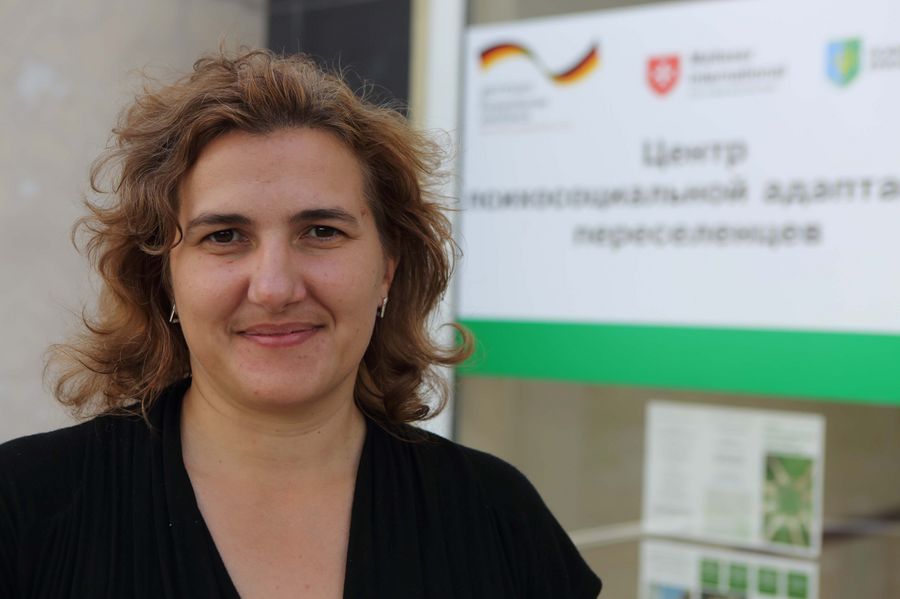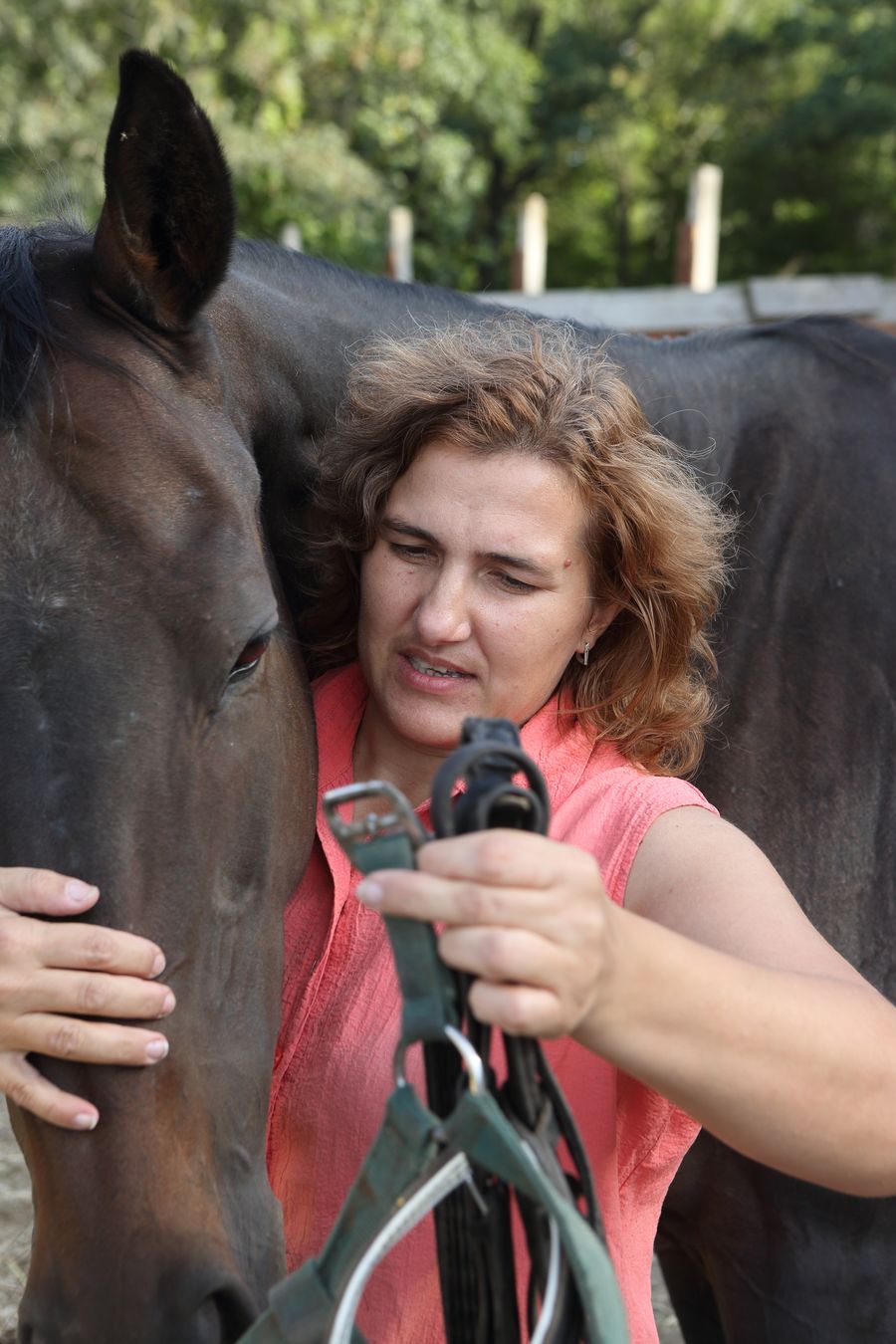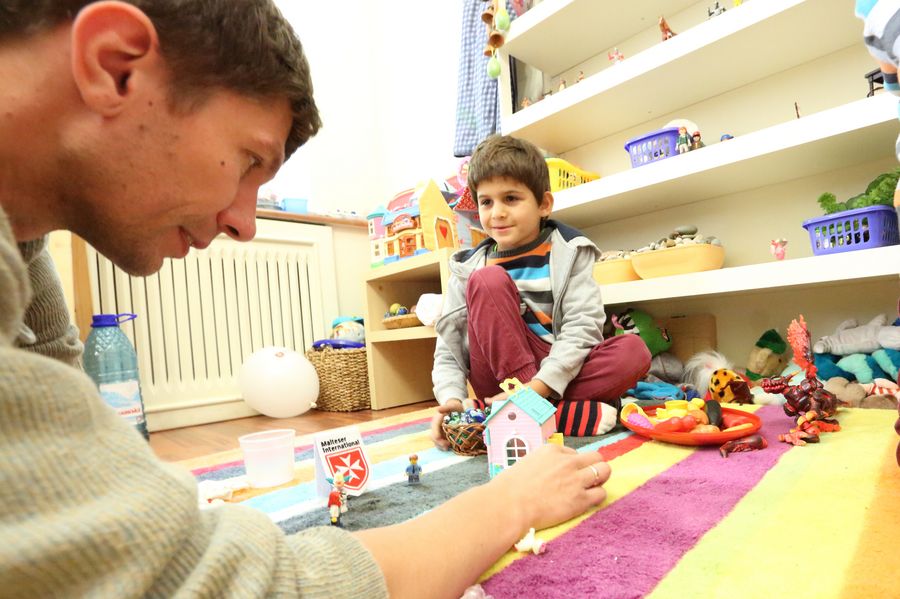Oksana L. - A refugee helping displaced people
Psychosocial help for displaced people in Ukraine

"Regret is a hollow comfort. When you cannot change your life, you have to change your outlook on life" - or so thinks Oksana L., a 38 year old psychotherapist from Ukraine, who is married, with two children, and who runs Malteser International’s center for psychosocial care and mental health in Sievierodonetsk in the Ukrainian region of Donbass. When her home town was taken by separatist forces in 2013, she fled with her family to Belarus. While she was there, she regularly sent money to the Ukraine for the care of her horses, which she uses for therapy sessions, especially with children.
“Our center here was opened on the 1st August," says Oksana. "Around 47,000 displaced people live in the city at the moment – which is around a third of the total population. Many of them have no hope left at all of being able to go home – but it is still something that they dream of every day. For them it is especially important that we connect their lives today in some way with those that they used to live. Often they say ‘We will do it like at home!’ Because of their initiative, there are popular and active yoga groups, as well as women’s and craft clubs here. Our debating group is also very popular. It is important that people in their situation do not remain alone, but that they have opportunities to interact – to discuss questions and problems, or indeed, even to have a disagreement with one another.” Every month, an average of 70 displaced people use the center, which is run in cooperation with the Ukrainian Maltesers and the Psychological Crisis Service in Kiev. Individual and group sessions are on offer, and the various groups and clubs have around 30 regular participants.
Flight to Belarus via Kiev

Recently, Oksana has been able to put her horses to use for therapy again. In 2013, before the war, she founded her own center “New Horizons”, for the treatment of children with behavioral problems through riding therapy. “Riding therapy is, for me, the most effective way of dealing with psychological and physical problems,” she explains. “Horses are very loyal and intelligent animals. Contact with animals can be highly beneficial – especially for children. They learn to overcome their anxiety when they trust themselves to sit on a horse. Riding therapy also trains the posture and balance of the children, as well as providing a form of relaxation that helps them to cope with everyday life. The horses are also an important aid for me because they make it easier for me to connect with my patients – both big and small – and to engage with their needs and concerns.”
When the war came to Donetsk in March 2014, however, everything changed. “There were military and checkpoints everywhere,” says Oksana. “People were afraid to go into the street. They ended the school year early and the children were sent to secure areas. We send our children to my father in Kiev. At first, I stayed behind to look after the horses, but as the fighting and bombardment came closer, I fled to Kiev as well. After six weeks, we decided to go to my Mother in Law in Belarus. I wanted to be with my family somewhere where there was no shooting, and where I could work and earn some money. I still had to feed my children and pay for my horses. First of all, though, my husband had to leave our home. For a whole week, we had no contact, because people had to sit in their cellars day and night. It was a week of tears. Finally, on the last day of the bombardment, my husband was able to pass the 17 checkpoints to leave the city and to pick us up in Kiev. We were finally together again!”
At first, it was only supposed to be a short stay in Belarus, but it turned into a whole year. Oksana's children went to school there, and her husband worked to feed the family and to pay for their home and horses back in the Ukraine. It was a very difficult time – there was never enough money, and the whole family of five lived in a one-bedroom apartment. “I suffered greatly because of the situation, and had enormous psychological problems with dealing with everyday life. The feeling of hopelessness in me was overpowering,” Oksana narrates regarding her stay in Belarus. “But in the end, I needed this year in Belarus and the distance from home in order to restore my mental health and get my strength back. When I was better, I moved back to the Ukraine with my children. My husband is still working in Belarus.
A displaced person helping displaced people

Oksana learned about the new center for providing psychosocial help to displaced people in Sievierodonetsk from a friend: “I was interested straight away. I just had the greatest wish to help these people – because I knew from my own experience what kind of burden it brings to be displaced, on the run, and to have to lead your life in a foreign country. Today, I can be thankful that I experienced these things and was able to master them. When I can help the people that come to us to change their outlook on life, then we can find solutions to their problems together – and a place that is alien to them can even become their new home.”
Interview: Pavlo Titko / Conor Heathcote (October 2015)








